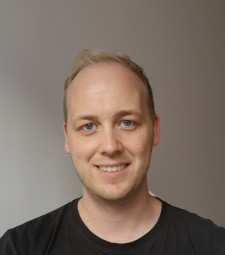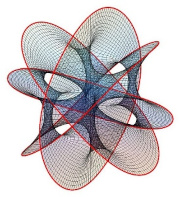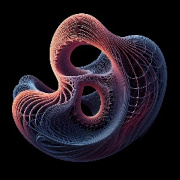Villum Young Investigator Grant to Zakarias Sjöström Dyrefelt
Zakarias Sjöström Dyrefelt is awarded a Villum Young Investigator grant to pioneer new ways to test solvability of geometric partial differential equations in practice, to improve our understanding of high dimensional complex geometric shapes.

Geometry is the science of shapes, from the basic sphere or torus (a doughnut shape) to much more complicated shapes occurring in physics as solutions of Einstein’s field equations. Although classification of shapes has been ongoing for centuries, many open questions remain in modern mathematics. Of particular interest are several open conjectures related to solvability of partial differential equations over complex shapes. This is a question that has fundamental importance in mathematics and natural sciences, with the completion of a mathematical ’periodic table of shapes as an ultimate goal.
The project ‘Effective Testing in Complex Geometry’ will pioneer a new strategy to test in practice, for the first time, solvability of a unifying class of PDE capturing many equations of interest in mathematics and physics. Its key novelty is to reinvent abstract solvability criteria – taking the leap from an infinite number of conditions, impossible to test in practice, to a finite number of explicit conditions that can be programmed into a computer. Building most notably on the work of Fields medalists S.T. Yau and S. Donaldson, this opens new perspectives to discover and concretely grasp several subtle phenomena related to deep geometric conjectures, based on previous work of Dyrefelt on these topics, and introduces some of the first computer-aided classification methods beyond Donaldson’s program and Calabi-Yau databases in physics. The techniques uniquely combine recent work of Dyrefelt on effective testing on four-dimensional shapes, with expertise in constant curvature and an in-depth analysis of the geometry of curves, opening new avenues of feasible research in an otherwise challenging area of pure mathematics.
“On a personal level the lack of ‘examples’ – of geometric shapes where solvability of partial differential equations is completely understood – has been one of the most important obstacles for further theoretical advances in my own research, and in the field at large. Working with a team on a large-scale project to analyze and add thousands of examples to a previously very short list would therefore be an invaluable help in driving the field forward. Since the focus is not only on open problems in abstract geometry, but also on concrete low dimensional geometry (especially 4 and 6 dimensions), I hope that the Villum grant will allow me to multiply collaboration possibilities, getting potentially closer to increasing the impact of my theoretical work also outside of the mathematical field of geometry, e.g., to physicists researching the geometric structures we investigate. To achieve this the new tools and analyzed examples resulting from the grant will be shared with the scientific community via an Open Access database.”
– Zakarias Sjöström Dyrefelt from Department of Mathematics and AIAS fellow at the Aarhus Institute of Advanced Studies
The Villum grant enables Zakarias Sjöström Dyrefelt to fund two postdocs and one PhD student, and to organize two international workshops to extend international research exchanges.
The aim of the Villum Young Investigator is to support early career researchers with ambitions of creating their own, independent research identity, and with the potential to significantly contribute to research in technical and natural sciences at a Danish research institution.
External links



